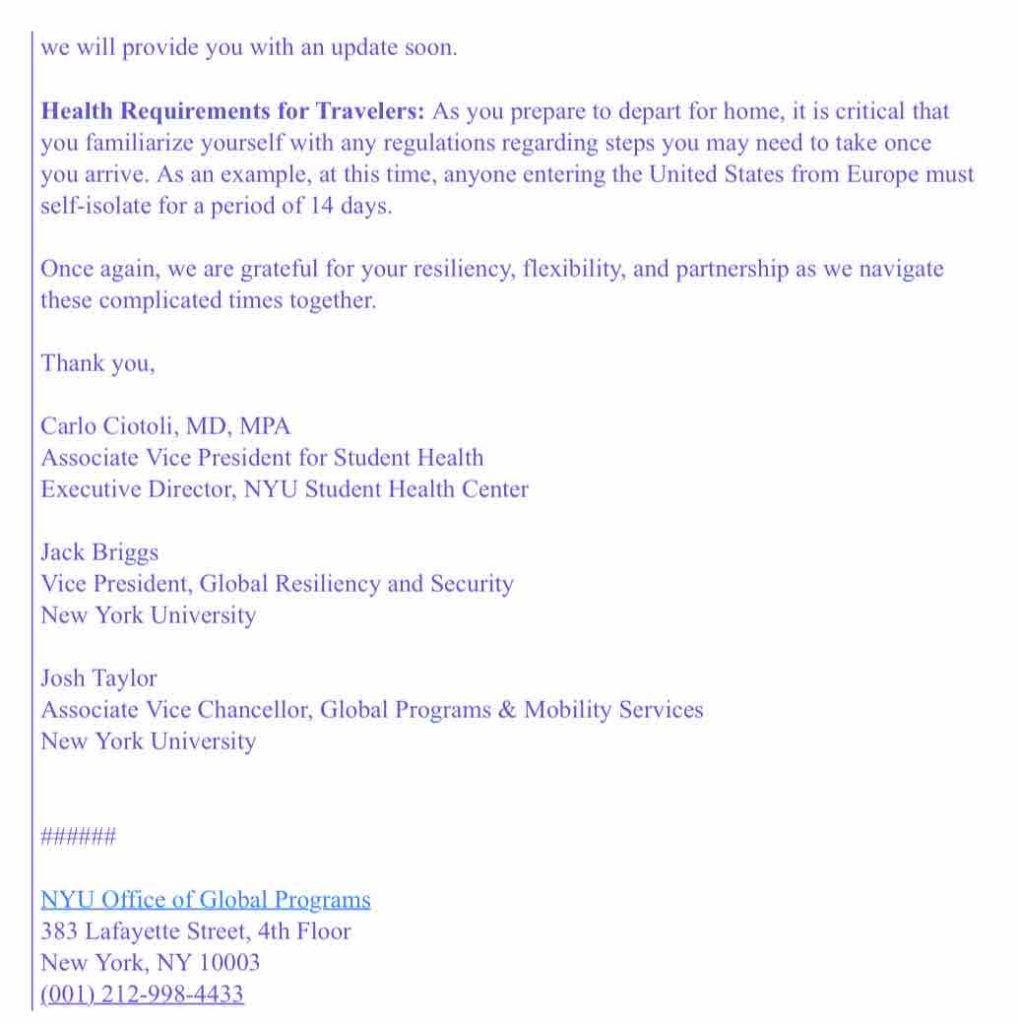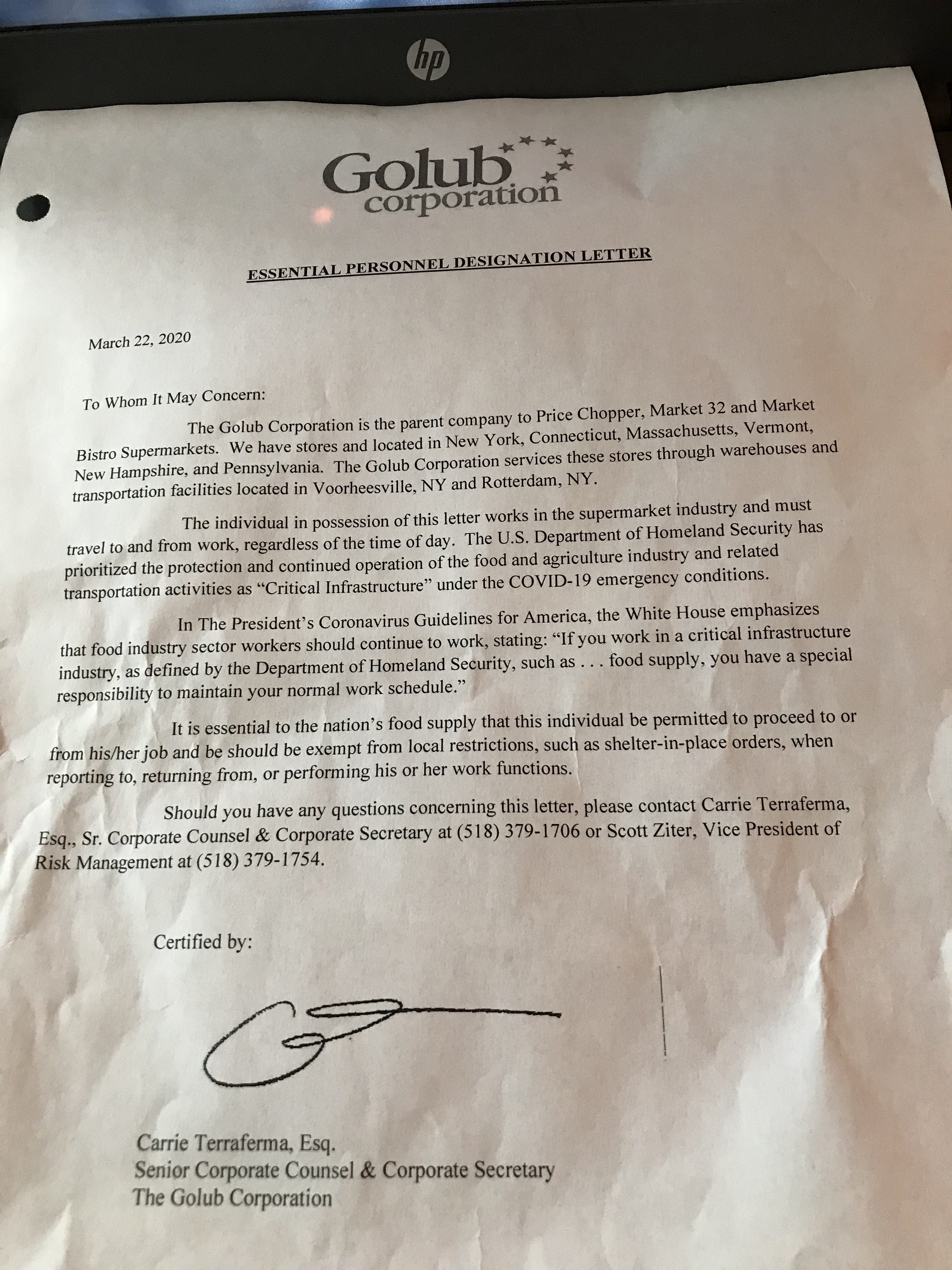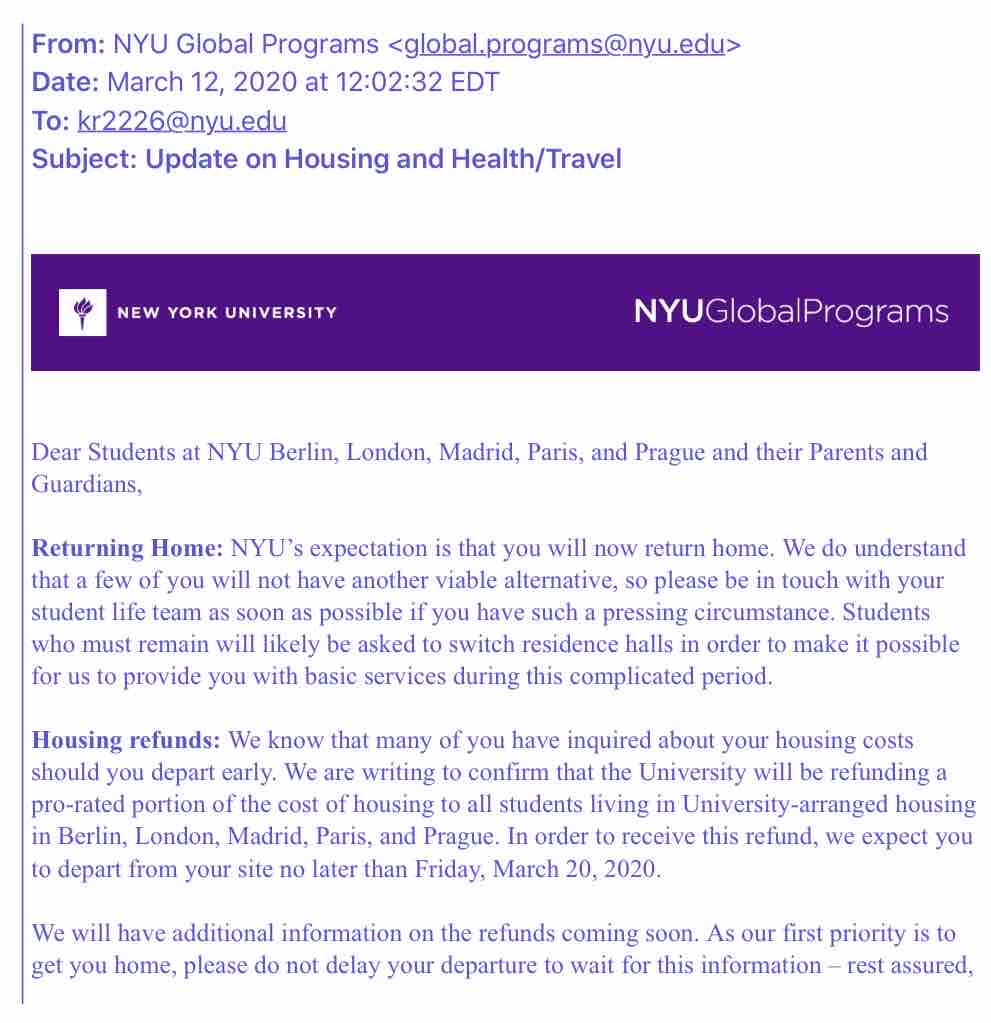By JOURNALISM I
Repercussions from the novel coronavirus are reaching the communities where students from The College of Saint Rose live. Journalism students from Brooklyn to Baltimore, New Jersey to Connecticut, practiced social distancing when they contacted sources in their own communities, and interviewed family members affected by the virus. Here are their stories:
From North Andover, Massachusetts:
The usually bustling Main Street in North Andover, Massachusetts has become a ghost town of sorts. Lisa Grieco, 44, has felt the effects.
She has owned GroomTown Pet Boutique and Spa for the last 13 years where she works as a professional dog and cat groomer while overseeing seven full time employees. Now, only one client is allowed in her shop at a time. She has changed her disinfecting procedures, and limited the traffic in her store to help keep the pandemic at bay. The coronavirus actually sparked quite a bit of business for GroomTown.
“People wanted to have their pets groomed before we go on lock down,” said Grieco. “Even though I wasn’t forced to shut down I decided to keep my employees safe. They’re a big part of who we are as a business.”
She is now starting the second week of her two week shutdown. In implementing social distancing and being away from work, Grieco, like others, has had to adapt.
“It’s definitely different. I’m having a hard time not being around people,” said Greico, who remains optimistic. “The pet industry has been resilient even when the economy was down. Once we get through this I believe we will continue to strive.”
Right next-door to Grieco is J&W Shoe Repair, owned and operated by Wisam Nakkoul, 43. Here he fixes shoes and pocketbooks while also providing a range of other services on leather products. Nakkoul, the sole-employee of J&W Shoe Repair, has decided to take on the challenge of the pandemic and get creative.
“I got the idea to start doing gift certificates but I will also give a 25% higher value on it,” he said. “If they bought a gift certificate for $100, I would give them it for $125 instead.”
For a small business, a few months can feel much longer under these sorts of economic conditions so it’s up to quick thinking to keep them afloat.
“The first few days of this, I still had some jobs to finish up from before all of this but as of now, no money, no customers,” said Nakkoul. “But you still have to worry about paying bills like rent and all that.”
Nakkoul now offers a 25% discount for all transactions. Like other businesses, he has tried to generate business while taking into account the financial hardships of his customers.
– Maya Nakkoul
From Binghamton, New York:
About 136 miles west of Albany, an assisted living facility continues to stay up and running for its senior residents in Binghamton.
For the last 19 months, Karina Beco has walked through the employee entrance to begin her shift as a dietary server at Good Shepherd-Fairview Home. Her routine when she arrives at work was disrupted a few weeks ago when the employee entrance was changed. Now she is screened for the virus, just like all employees and visitors. An employee checks her temperature, and inquires about her health and her travel.
She is required to wear a mask and hand washing is a priority while she works on three floors.
This mother of two—14 and 18—does not want to infect her family, while she still juggles the responsibility of caring for her children and helping them with their online classes and homework.
“I know who I’m around, but I don’t know who they’ve [her co-workers] been around,” Beco said. In Broome County, one death had been reported four miles away at Lourdes Hospital on Saturday.
Visitors are restricted from Good Shepherd at the same time not all of the residents are completely aware of the outbreak. A bible study group is one of the few still functioning activities.
Still, Beco managed to have an interaction with a resident who was finding the bright side when she offered Beco a gold coin for luck.
– Kaylina Calzado
From Baltimore, Maryland:
Students abroad have had their fair share of challenges since the spread of the novel coronavirus.
When 20-year-old Kendall Ross received notification from New York University that she needed to pack her bags and return to Baltimore, she made the retreat from her living quarters to a packed Charles De Gaulle Airport in France. She moved through a mass of travelers where she saw new signage and a crowd dotted with face masks. Now, she is finishing her semester from home with online classes on Zoom.
“It was all very quick, sudden,” said Ross. At the airport Ross felt the angst and watched some distancing, and the response to the once familiar sound of coughs and sneezes. She also had to contend with a canceled flight to Washington, D.C., which she rescheduled for the next day.
When she arrived at Dulles International Airport, she was asked if she had traveled to China’s Wuhan province, or Iran in the past two weeks. Passenger temperatures were taken and travelers filled out additional forms.
Following the screenings, passengers picked up their luggage and started on their way home. “I remember finally getting my bags and thinking ‘Wow I did it, I survived coronavirus,’” Ross said.
Once home, she self-isolated and set up a classroom in her bedroom. Then she started to feel symptoms of the illness: she had a dry cough and gastrointestinal problems. Her medical providers instructed her to self-isolate and since her symptoms were minor, so she would not be tested.
“I was not prepared by anyone or anything for this,” Ross said. “It’s hard to remember what my life was like before all of this. It’s hard to remember what I was thinking about before I was thinking about coronavirus.”
Her bedroom isn’t the same as the classroom, and that shift plus the constant communications from her school have added even more pressure.
“When I went to school, I was at school. I don’t feel like I’m out of school ever now. And that is really stressful,” Ross said. “This is a really hard time for all of us.
“Being a young person is really hard right now,” said Ross. “I wish that more people understood what it’s like to be in the position that I’m in, that many young people are in right now.”
– Jaylin Roundtree
From Colombia, South America, via Queens:
Among other international residents, Saint Rose student Maria Carvajal, 19, was provided housing from the college, but chose to fly home when she learned the borders were closing there.
“Me and my parents don’t know when they’ll open them again and I didn’t want to stay on campus all alone for longer than like three months,” she said. “So I came just to be with them and be able to see them.”
Since then she has been in her bedroom isolating herself because of her travel.
“If I can’t control what’s going to happen at least I can control what’s going on right now,” said Carvajal, a sophomore in the music industry program. “Since I’m always in the room I feel like I’m doing less, so I do more…It’s a pretty big change in my everyday routine and it changed and cancelled so many plans and things that I was counting on.”
– Jada Hart
From Schenectady, New York:
One Schenectady resident, Mallory Mrozinski returned home from her job in France where she had worked since September. She teaches English as a second language and is a contractor for the French government in Dijon.
“Like many people, I didn’t realize how quickly it would become a global issue,” said Mrozinski. She was forced to say goodbye to her students early and up in the air.
“All businesses were closing besides supermarkets and pharmacies. I knew it was a much more grave situation than I had anticipated, so I knew it was time to go home,” said Mrozinski, originally planning on staying there until her school had reopened.
Mrozinski contacted the Embassy there and found a flight with a layover in Germany.
“My heart did not stop racing until I was on the last leg of the trip,” said Mrozinski. When she finally arrived at the Newark airport last week, passengers were asked to stay in their seats while the representatives from the Center for Disease Control checked body temperatures on each passenger, all of whom were asked to self-quarantine and to monitor their temperatures.
– Machaela DeSano
From Little Silver, New Jersey:
Home life for many families has changed substantially.
Kerin Nash works at home where she is now caring for her 26-year-old son, Brendan, who is disabled. Her home life is different since the quarantining.
The day program Brendan has attended for 23 years at The Children’s Center of Monmouth County in Neptune, N.J. shut down to stem the virus. Now Nash has Brendan home along with her son, a senior at The College of Saint Rose, and her husband, the head of pediatric cardiology at New York University’s Langone Hospital in Manhattan.
“The fact that Frank has been trying to do a lot from home has been helpful because I’m not constantly by myself. He’s trying to do clinic from virtual mode,” Nash said.
Dr. Frank Cecchin described the conditions at his hospital.
“It’s like a siege mentality,” he said.
Visitors are not permitted for adult patients, except in special circumstances, and child patients are allowed one designated parent, and only one for the entirety of the visit.
“No patients are allowed visitors unless it’s essential,” said Cecchin.
Other visits are limited, children can see one parent, and as of this interview, fathers were allowed to participate in births.
“It’s created anger and disruption,” Cecchin said. “NYU is trying to minimize traffic because people are afraid of being infected.”
Doctors have maintained their communication through Zoom and Cecchin was scheduled to go into the hospital for a non-elective surgery.
“Everything I’ve been doing has been leveled. I can’t go do Pilates, I can’t go to my writing class. Bren constantly wants a show on, or he’s downstairs, or he’s handing me shoes, or he wants something to eat or drink,” Nash said. “It’s wearing on the patience, at least on my end.”
Nash had stepped out of the kitchen to get some air on the deck.
Despite remaining calm, it’s a frustrating situation. “I’m trying to be thankful for days like these where it’s nice out. I’m glad people are learning what it’s like to not have a life of your own. I’ve been learning this for years. You think you get compromised for a few days, and you think you know what it’s like to have your entire life hijacked.”
– Conor Meehan
From Griswold, Connecticut:
Griswold High School students, Jeff Souvenance and Christian Russell, in Connecticut, keep in contact by playing video games with each other online.The friends also work on homework.
Souvenance found solace in basketball after the quarantine was first announced and freedom from feeling like he was in prison when he was forced to stay inside. He said staying at home was like being in “a prison.” He wants to get outside and do more than work out and other indoor activities. Besides going to Russell’s, Souvenance and his girlfriend take turns hanging out at each other’s houses and at the beach.
– Carl McDonald
From Albany, New York:
Emily Guererri, 22, worked as a waitress at Juniors, on Madison Avenue in Albany when she was laid off almost two weeks ago. She did what millions of other people did and went to file for unemployment on the state’s Department of Labor website.
“It has been an absolute nightmare,” said Guererri.
She was assigned a specific day to contact the department but when she returned to the web site it kept crashing. Finally, she was half way through her filing when the phone call was disconnected. She still has not gotten satisfaction.
“Right now I am angry that my job was taken from me with no warning and now I am getting absolutely no support from the government that took that job away,” Guererri said.
–Leanne DeMartino
Grocery companies like Market 32 are having trouble keeping toilet paper, hand sanitizer, Lysol, and other cleansing and hygienic products in stock.
Employees like Elizabeth Wood, the customer service and hiring manager at Market 32 on Delaware Avenue, are working exhausting hours to keep customers attended to.
“My duties change day by day,” said Wood. “Our daily tasks now include more sanitizing behind every customer and after every transaction.”
In addition to ramping up disinfecting efforts, the company is also “encouraging teammates to keep themselves and guests safe by social distancing not only in the workplace but also at home.”
Wood is taking precautions herself to limit the spread of the virus to her friends and family.
“Besides limiting my exposure to public places, I have had to avoid contact with a few of my family members and friends that have pre-existing health issues in hopes that I won’t spread the virus to them,” said Wood.
To avoid exposing herself and others to the virus, Wood only buys groceries from her Delaware Avenue store and shops at other stores only if absolutely necessary.
“We aren’t just going to turn around one day and the virus will be gone,” Wood said. “This virus will spread and we won’t know it’s true long term impact for quite some time.”
–Tyreiq Mohamed




